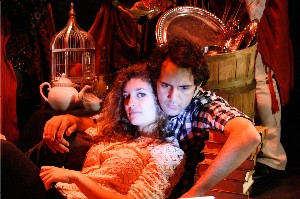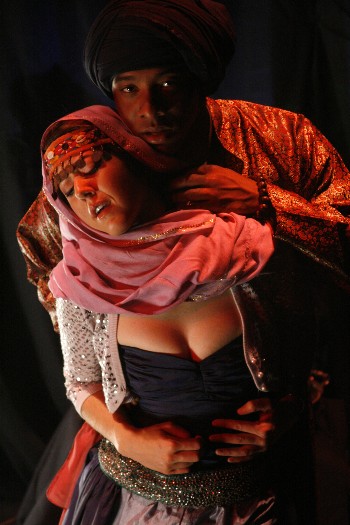Theatre Review: 1001 — Fun Until the Scimitar Falls
Dramatist Jason Grote spins a postmodern, political variation on Scheherazade in his play 1001, and while it skimps on the imaginative playfulness of other versions, its time-tripping allusiveness has a scruffy, intellectual charm.
1001 by Jason Grote. Directed by Megan Sandberg-Zakian. Staged by Company One at the Boston Center for the Arts, Boston, MA, through August 13.
By Bill Marx
In Chimera, his wonderful 1972 collection of novellas, American writer John Barth mischievously rejiggers the framing story of Scheherazade, the famed storyteller of the One Thousand and One Nights. He has himself pop in from the future to give the woman the idea of using a succession of interrupted tales to defeat the deranged King Shahriyar, who decapitates his wives (so they can never be unfaithful to him) after deflowering them.
The postmodern point is not that Barth wants to take credit, but that he wants to assert (albeit self-consciously) the unbroken line of writers who spin yarns as a way to counter death—it is as good a strategy as any to take up the time of being alive, more nurturing than most. Dramatist Jason Grote spins another, more political variation on the Scheherazade machinery in his play 1001, and while it skimps on the imaginative playfulness of Barth, its time-tripping allusiveness has a scruffy intellectual charm—generally served well by the Company One production—before it settles into fantasy-killing earnestness.
I hoped that Barth was going to show up in 1001 (he doesn’t), given that Grote’s Scheherazade roams through time and space and authors in search of fodder for her stories, which include Scheherazade herself appearing in Times Square to wonder at the neon chaos of it all, a cameo appearance by Osama bin Laden as a host of a TV program dedicated to screening horror films, a tongue-in-cheek Arabian version of Alfred Hitchcock’s Vertigo, a narcissistic sexual adventure in the Middle East starring Gustave Flaubert, and a meeting between an existentially bored Sinbad the Sailor and Jorge Luis Borges.
All of this is fun, but numerous opportunities for high-flying fantasia are missed, especially when it comes to the colonial indifference of the play’s Flaubert (Read Francis Steegmuller’s classic Flaubert in Egypt to get the real low down), and Jorge Luis Borges talks like an Argentinian fortune cookie (“As usual, I obscure more than I illuminate”). The insertion of Osama hammers home that Grote wants to move from the original Scheherazade’s fight for life against moral absolutism and mortality to dramatize the fraught relationship between authoritative (and authoritarian) narratives and power. The country whose self-serving story of its history dominates the media shapes our sense of The Other, a dehumanization that invites (permits?) destruction. Stories are dangerously malleable, a matter of perspective and agenda—which is why there are different versions of some of the yarns in 1001.
The second half consolidates around the troubled romance (and cultural studies cliches) of a young Palestinian woman named Dahna and her New York Jewish boyfriend, Alan. They meet “cute”—he buoys her up after she is arrogantly cut off trying to ask Alan Dershowitz (appearing on a panel discussion at Columbia University) a question about about institutional divestment. Lauren Eicher plays Scheherazade as well as Dahna, while Nael Nacer plays the roles of Shahriyar and Alan, so the ironic parallels are spelled out, perhaps a bit too obviously. (Where’s the cameo by the late Edward Said to complicate the picture? Especially given that the play presents the couple making a trip to Gaza?) Once Dahna begins to spout potted dialogue about being trapped in a narrative not of her making, Grote’s heavy message-mongering comes down on 1001 like a king’s scimitar. A violent ending echoes 9/11 and includes a Djinn who, unlike the anarchistic imps of yore, likes to rub mortals’ noses in their limits as storytellers—they want to control the fruits of their imagination too tightly.
On the debit side, the Company One production suffers from being over emphatic, the customary sin of “story theater” productions. The cast, of which four members take on a variety of roles, proffers its share of silly voices—performers tend to boom too often, as if Viziers and Kings have to be overheard at all times by everyone in the palace. Ben Gracia’s The One-Eyed Arab, who announces the title of each tale, sounds as if he was hosting Let’s Make a Deal and continually asking to see what is behind Curtain # 1. And we get another version of my perennial favorite—a young actor adopting the wizened-to-a-cackle, “old man” voice.
Yet the production is anchored in some strongish performances: Lauren Eicher provides an attractive and relatively modulated turn as woman ancient and modern; Nael Nacer has understandable problems dealing with playwright’s decision to give Shahriyah a tiresome proclivity for malapropisms, but his Alan neatly combines the hapless intellectual’s comic and desperate sides. The energetic Ruby Rose Fox comes up with some amusing comic touches, especially for the script’s sexual antics, though she has a tendency to run her rubber-faced schick into the ground. It would have been nice if director Megan Sanderg-Zakian had reined in the cast more; Elisabetta Polito’s costumes are colorful additions, especially given the set, barren aside from some multi-purpose hassocks.
Overall, 1001 suggests reassuring things about Grote as a dramatist—he is open to literate flights of fancy, complex ideas, and an intricacy of construction that asks the audience to think. It will be interesting to see other nights (1002?) of theater authored by him. But Grote should listen to his play’s Borges: don’t work so hard to illuminate; let the imagination soar.


